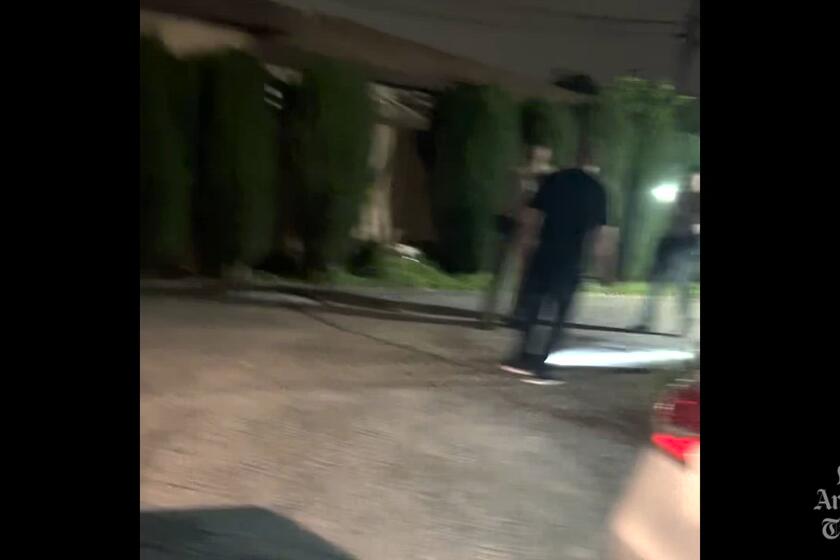Crackdown Urged on Sober-Living Houses : Housing: A state official calls on the county to correct overcrowding, profiteering and other abuses in private homes that rent rooms to recovering addicts and alcoholics.
The director of state Drug and Alcohol Programs called on Los Angeles County supervisors Wednesday to crack down on overcrowding, substandard conditions and profiteering in privately run homes that rent rooms to recovering drug addicts and alcoholics.
Meanwhile, a top county health official ordered a staff sweep through such sober-living homes after The Times reported Wednesday that some addicts have been crowded 10 to a bedroom or squeezed into attic crawl spaces.
But even as the inspections began, county probation officials pointed out additional examples of substandard conditions in such facilities and called for a task force to set standards and investigate abuses.
At one East Los Angeles sober-living home, probation officials said they discovered people living in a metal shed and plywood huts in the back yard, while the main house was littered with open beer bottles.
Two of the residents had been placed there by a judge as a condition of probation, said Sharon Malachi, staff consultant to the probation department’s Narcotics Testing Office.
“These sober-living homes are cropping up all over the place. . . . The problems are pervasive,” Malachi said. “Somebody has to step in.”
The privately operated, unlicensed homes are set up as temporary shelter for addicts recently graduated from publicly funded drug treatment programs, as well as for parolees or probationers with drug and alcohol problems.
Los Angeles County drug treatment officials have promoted these homes as a low-cost way of helping addicts stay off the streets and off drugs. They have awarded operators about $600,000 in start-up grants during the last few years. They use county hot lines, county counselors and county vans to help fill the homes with recovering addicts. County welfare checks often pay the rent. However, officials do not license or inspect the homes.
Supervisor Ed Edelman called sober-living homes a “good idea” in theory. But he said he will introduce a motion next week asking county welfare and drug officials to recommend “some sort of inspection procedure” to prevent abuses.
Supervisor Deane Dana agreed that the homes need additional oversight and said he plans to ask for an investigation next week.
Anthony Mecca, the state’s top drug treatment official, said the county has an “enormous vested interest” in ensuring that addicts graduating from treatment programs are referred to legitimate sober-living homes. He said reports in The Times of abusive management and substandard conditions at many homes present “a challenge to the Board of Supervisors.”
Pointing out that the facilities receive public dollars, Mecca said: “The public and the clients (in these homes) deserve some sort of accountability.”
Mecca said that the county’s drug and alcohol budget has been increased during the past two years, so resources are available to fund monitoring of sober-living homes.
Caswell Evans, assistant director of public health programs for Los Angeles County, said he has asked drug treatment officials to inspect all sober-living homes described in The Times.
“We do have concerns if living standards and health standards are being violated,” he said.
Rochelle Ventura, chief of the county’s Alcohol and Drug Program Administration, was unavailable for comment Wednesday.
But her top aide, Alton Wright, said he is trying to assess “how many bad apples there are out there. . . . We’re discussing what we can do to make things better.”
The chairman of the county’s advisory Alcoholism Commission, Gene Webster, said he has asked for an explanation of how one home, Priscilla’s Place in Pasadena, received $20,000 in county start-up money when it lacked the necessary local permits and licenses to house 12 women and their children.
Officials in the Narcotics Testing Office said probation officers frequently refer clients with drug problems to sober-living homes. However, there is no formal policy for screening them.
“We’re going to take a closer look,” said Sandra Summe, director of the Narcotics Testing Office.
But Malachi, a staff consultant, pointed out that probation officers have little recourse when the judge selects the home. Often, she said, the judge knows the home only from flyers or business cards left in the courtroom.
Just last week, she said, she discovered that a judge--whom she declined to identify--had sent two probationers to a sober-living home in East Los Angeles where the primary restroom is an outdoor privy.
A metal shed in the back yard is used to “detoxify” addicts, she said. Others are given mattresses in four plywood sheds. The main house was strewn with open beer containers, she said.
GETTING SOBER
Two people who made it, and one who didn’t, at sober-living houses. E1
More to Read
Start your day right
Sign up for Essential California for news, features and recommendations from the L.A. Times and beyond in your inbox six days a week.
You may occasionally receive promotional content from the Los Angeles Times.






